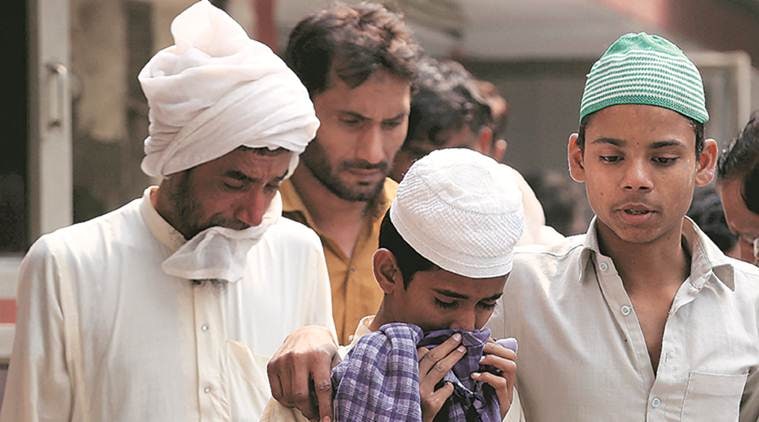 Mohamamd Azeem’s father Khalil Ahmad (left). (Express photo By Amit Mehra)
Mohamamd Azeem’s father Khalil Ahmad (left). (Express photo By Amit Mehra)
Mohammad Mustaqim (13) and Mohammad Mustafa (11) had come prepared for the 5am class at the Darul Uloom Faridia madrasa. But neither could present a perfect recital, as per the teacher’s instructions.
Then came the turn of their younger brother Mohammad Azeem. He recited 15 verses selected by his teacher, Mohammad Shakir. “It was perfect. He was smarter than his elder brothers,” Shakir said.
Azeem then left the madrasa, while his brothers went for breakfast at 8 am. “The last time I saw him, he was chasing a cat. I next saw him lying on the ground. Azeem did not move. I wish I had skipped breakfast; I could have been with my brother,” said a teary-eyed Mustaqim.
As the two brothers waited for Azeem’s body outside AIIMS mortuary, their father, Khalil Ahmad, remained stoic. Two men from the mosque insisted that he join them for a protest march. But Ahmad folded his hands and replied: “A tree cannot face a storm. I must bend or I will break. I want to leave with my son’s body. I don’t want to play politics over his death.”
The two men continued to argue even as Ahmad squatted on the floor, staring blankly at the ground. “I wanted my son to become a translator working for a hospital. His Arabic was good and there are people from the Middle East who come on medical visits to India,” he said.
Azeem came to Delhi in 2017 with his two elder brothers. Ahmad works as a labourer in Mewat and is paid Rs 300 for a day’s work. He has two other sons, who work as labourers, and an elder daughter.
After a long wait, mortuary officials called Ahmad to identify his son’s body. He came out soon afterwards, in tears.
A mosque-goer patted his back and said, “We will fight for your compensation.” Another said: “It is unfortunate he was murdered. But he will be with god.” Ahmad retorted: “What compensation? You think I will sit and fight here for your cause? You should have taken care of my son; he was in your care.”